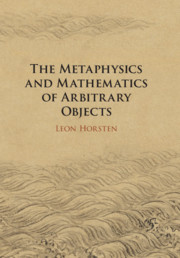
-
Select format
-
- Publisher:
- Cambridge University Press
- Publication date:
- 24 May 2019
- 13 June 2019
- ISBN:
- 9781139600293
- 9781107039414
- 9781108706599
- Dimensions:
- (247 x 174 mm)
- Weight & Pages:
- 0.6kg, 246 Pages
- Dimensions:
- (244 x 170 mm)
- Weight & Pages:
- 0.441kg, 250 Pages
- Subjects:
- Mathematics (general), Mathematics, Philosophy of Science, Philosophy
You may already have access via personal or institutional login- Subjects:
- Mathematics (general), Mathematics, Philosophy of Science, Philosophy
Book description
Building on the seminal work of Kit Fine in the 1980s, Leon Horsten here develops a new theory of arbitrary entities. He connects this theory to issues and debates in metaphysics, logic, and contemporary philosophy of mathematics, investigating the relation between specific and arbitrary objects and between specific and arbitrary systems of objects. His book shows how this innovative theory is highly applicable to problems in the philosophy of arithmetic, and explores in particular how arbitrary objects can engage with the nineteenth-century concept of variable mathematical quantities, how they are relevant for debates around mathematical structuralism, and how they can help our understanding of the concept of random variables in statistics. This fully worked through theory will open up new avenues within philosophy of mathematics, bringing in the work of other philosophers such as Saul Kripke, and providing new insights into the development of the foundations of mathematics from the eighteenth century to the present day.
Reviews
‘For the initiated reader, the book promises to add new life to research on arbitrary objects.’
R. L. Pour Source: Choice
‘… the work constitutes an important contribution to the analytical philosophy of mathematics.’
Athanase Papadopoulos Source: zbMATH
Contents
Metrics
Altmetric attention score
Full text views
Full text views help Loading metrics...
Loading metrics...
* Views captured on Cambridge Core between #date#. This data will be updated every 24 hours.
Usage data cannot currently be displayed.
Accessibility standard: Unknown
Why this information is here
This section outlines the accessibility features of this content - including support for screen readers, full keyboard navigation and high-contrast display options. This may not be relevant for you.
Accessibility Information
Accessibility compliance for the PDF of this book is currently unknown and may be updated in the future.


